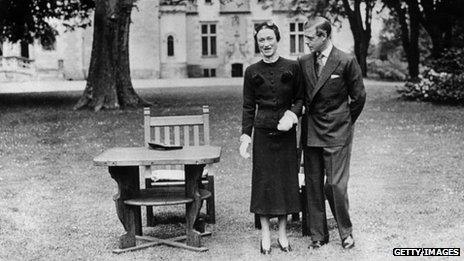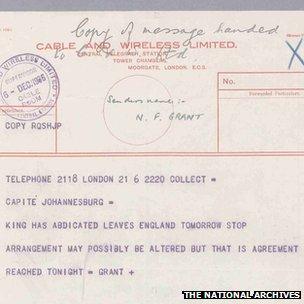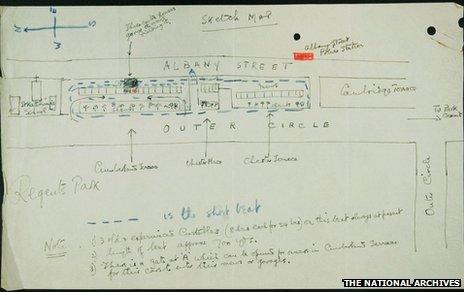King Edward VIII bugged during abdication crisis
- Published

After his abdication, Edward was given the title Duke of Windsor
King Edward VIII was bugged by the government at the height of the 1936 abdication crisis, files released by the National Archives show.
The Home Office ordered "interception of telephone communications" between royal residences and "the continent of Europe".
The King's divorced mistress, Wallis Simpson, was in France at the time.
The file also shows police had earlier investigated a reported bomb threat, external against Mrs Simpson in London.
The information is included in Foreign Office and Cabinet Office papers, which date from World War II and the early Cold War period.
In November 1936 - a time when the Church of England would not remarry a divorcee while their former spouse was still alive - the yet-to-be-crowned new king told Prime Minister Stanley Baldwin he planned to wed Mrs Simpson.
Mr Baldwin took the view this would be impossible if Edward was to remain king.
After the story broke in the press, it was thought he might go ahead with the marriage, forcing Mr Baldwin to resign.
With the King holed up at Fort Belvedere, in Windsor Great Park, and Mrs Simpson staying with friends in the south of France, Home Secretary Sir John Simon instructed the General Post Office (GPO) to covertly monitor the king's phone calls.
A note from the Home Office to GPO head Sir Thomas Gardiner - dated 5 December 1936 and marked "most secret" - reads: "The home secretary asks me to confirm the information conveyed to you orally, with his authority, by Sir Horace Wilson that you will arrange for the interception of telephone communications between Fort Belvedere and Buckingham Palace on the one hand and the Continent of Europe on the other."
No records of any intercepted calls are included in the file.
On 10 December 1936, Edward accepted his fate, signing the instruments of his abdication to end his 326-day reign.
'False rumour'

Though telegrams erroneously reporting abdication were stopped, premature stories still ran overseas
Days earlier, telegrams bound for South Africa reporting that the King had already abdicated were blocked on the orders of the Home Office.
The sender of one of the telegrams - Neil Forbes Grant, London editor of the Cape Times - was then summoned to a meeting with the home secretary, whose report is among the files.
Sir John noted: "I reminded him that in 1815 a false rumour that we had lost the Battle of Waterloo produced a financial crisis and ruined many people.
"I asked him if he did not realise that his responsibilities as a journalist and an Englishman made the sending of such a message without definite authority as to its truth very improper and reckless."
The file also includes details of the police security operation put in place at Mrs Simpson's central London home weeks earlier.
In a letter to the home secretary, Metropolitan Police Commissioner Sir Philip Game said officers had been alerted to a report running in the US of a bomb threat to Mrs Simpson, but that investigations had uncovered no evidence of this.
However, following a request from the King, an "inconspicuous short beat" patrolled round-the-clock was set up around Mrs Simpson's home.
Sir Philip enclosed a rough sketch of the operation, adding: "The beat has resulted in preventing pressmen and photographers making a nuisance of themselves on one or two occasions.
"They have of course to be handled tactfully but so far no trouble has arisen."

Sir Philip apologised for his diagram, admitting it was "very rough I fear"
- Published23 May 2013
- Published23 May 2013
- Published23 May 2013